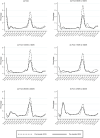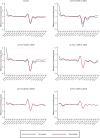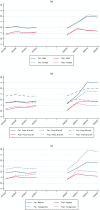Tracking the impact of COVID-19 on economic inequality at high frequency
- PMID: 33788886
- PMCID: PMC8012053
- DOI: 10.1371/journal.pone.0249121
Tracking the impact of COVID-19 on economic inequality at high frequency
Abstract
Pandemics have historically had a significant impact on economic inequality. However, official inequality statistics are only available at low frequency and with considerable delay, which challenges policymakers in their objective to mitigate inequality and fine-tune public policies. We show that using data from bank records it is possible to measure economic inequality at high frequency. The approach proposed in this paper allows measuring, timely and accurately, the impact on inequality of fast-unfolding crises, like the COVID-19 pandemic. Applying this approach to data from a representative sample of over three million residents of Spain we find that, absent government intervention, inequality would have increased by almost 30% in just one month. The granularity of the data allows analyzing with great detail the sources of the increases in inequality. In the Spanish case we find that it is primarily driven by job losses and wage cuts experienced by low-wage earners. Government support, in particular extended unemployment insurance and benefits for furloughed workers, were generally effective at mitigating the increase in inequality, though less so among young people and foreign-born workers. Therefore, our approach provides knowledge on the evolution of inequality at high frequency, the effectiveness of public policies in mitigating the increase of inequality and the subgroups of the population most affected by the changes in inequality. This information is fundamental to fine-tune public policies on the wake of a fast-moving pandemic like the COVID-19.
Conflict of interest statement
OA, AG, and JM are employees of the Research Department of CaixaBank. There are no patents, products in development or marketed products to declare. This does not alter our adherence to PLOS ONE policies on sharing data and materials.
Figures





References
-
- Gourinchas PO. “Flattening the Pandemic and Recession Curves” in Mitigating the COVID Economic Crisis: Act Fast and Do Whatever, Ed. Baldwin R., Weder di Mauro B. (Chapter 2, 31–40). CEPR Press, London, UK: ), 2020.
-
- Cicala Steve. Early economic impacts of covid-19 in europe: A view from the grid. Technical report, University of Chicago, 2020.
-
- Bick Alexander and Blandin Adam. Real time labor market estimates during the 2020 coronavirus outbreak. Technical report, Arizona State University, 2020.
-
- Chen Sophia, Igan Deniz, Pierri Nicola, and Presbitero Andrea F. Tracking the economic impact of covid-19 and mitigation policies in europe and the united states. Technical report, IMF WP/20/125, 2020.
-
- Chetty Raj, Friedman John N, Hendren Nathaniel, and Stepner Michael. Real-time economics: A new platform to track the impacts of covid-19 on people, businesses, and communities using private sector data. Technical report, NBER WP 27431, 2020.
Publication types
MeSH terms
LinkOut - more resources
Full Text Sources
Other Literature Sources
Medical

